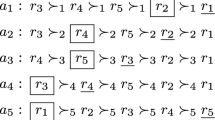Abstract
The Housing Market problem is a widely studied resource allocation problem. In this problem, each agent can only receive a single object and has preferences over all objects. Starting from an initial endowment, we want to reach a certain assignment via a sequence of rational trades. We first consider whether an object is reachable for a given agent under a social network, where a trade between two agents is allowed if they are neighbors in the network and no participant has a deficit from the trade. Assume that the preferences of the agents are strict (no tie among objects is allowed). This problem is polynomial-time solvable in a star-network and NP-complete in a tree-network. It is left as a challenging open problem whether the problem is polynomial-time solvable when the network is a path. We answer this open problem positively by giving a polynomial-time algorithm. Then we show that when the preferences of the agents are weak (ties among objects are allowed), the problem becomes NP-hard when the network is a path and can be solved in polynomial time when the network is a star. Besides, we consider the computational complexity of finding different optimal assignments for the problem in the special case where the network is a path or a star.










Similar content being viewed by others
References
Gärdenfors, P. (1973). Assignment problem based on ordinal preferences. Management Science, 20(3), 331–340.
Wilson, L. B. (1977). Assignment using choice lists. Journal of the Operational Research Society, 28(3), 569–578.
Abdulkadiroğlu, A., & Sönmez, T. (1998). Random serial dictatorship and the core from random endowments in house allocation problems. Econometrica, 66(3), 689–701.
Manlove, D. F. (2013). Algorithmics of matching under preferences (Vol. 2). Singapore: World Scientific.
Shapley, L., & Scarf, H. (1974). On cores and indivisibility. Journal of Mathematical Economics, 1(1), 23–37.
Abdulkadiroğlu, A., & Sönmez, T. (1999). House allocation with existing tenants. Journal of Economic Theory, 88(2), 233–260.
Roth, A. E., Sönmez, T., & Ünver, M. U. (2004). Kidney exchange. Quarterly Journal of Economics, 119, 457–488.
Alcalde-Unzu, J., & Molis, E. (2011). Exchange of indivisible goods and indifferences: The top trading absorbing sets mechanisms. Games and Economic Behavior, 73(1), 1–16.
Jaramillo, P., & Manjunath, V. (2012). The difference indifference makes in strategy-proof allocation of objects. Journal of Economic Theory, 147(5), 1913–1946.
Aziz, H., & De Keijzer, B. (2012). Housing markets with indifferences: A tale of two mechanisms. In Proceedings of the twenty-sixth AAAI conference on artificial intelligence (pp. 1249–1255).
Sabán, D., & Sethuraman, J. (2013). House allocation with indifferences: A generalization and a unified view. In Proceedings of the fourteenth ACM conference on electronic commerce (pp. 803–820).
Ehlers, L. (2014). Top trading with fixed tie-breaking in markets with indivisible goods. Journal of Economic Theory, 151, 64–87.
Sonoda, A., Fujita, E., Todo, T., & Yokoo, M. (2014).Two case studies for trading multiple indivisible goods with indifferences. In Proceedings of the twenty-eighth AAAI conference on artificial intelligence (pp. 791–797).
Ahmad, G. (2017). Essays on housing market problem. Ph.D. Thesis, Texas A & M University.
Gourvès, L., Lesca, J., & Wilczynski, A. (2017). Object allocation via swaps along a social network. In Proceedings of the twenty-sixth international joint conference on artificial intelligence (pp. 213–219).
Abebe, R., Kleinberg, J. M., & Parkes, D. C. (2017). Fair division via social comparison. In Proceedings of the sixteenth conference on autonomous agents and multiagent systems (pp. 281–289).
Bei, X., Qiao, Y., & Zhang, S. (2017). Networked fairness in cake cutting. In Proceedings of the twenty-sixth international joint conference on artificial intelligence (pp. 3632–3638).
Bredereck, R., Kaczmarczyk, A., & Niedermeier, R. (2018). Envy-free allocations respecting social networks. In Proceedings of the seventeenth international conference on autonomous agents and multiagent systems (pp. 283–291).
Beynier, A., Chevaleyre, Y., Gourvès, L., Lesca, J., Maudet, N., & Wilczynski, A. (2018). Local envy-freeness in house allocation problems. In Proceedings of the seventeenth international conference on autonomous agents and multiagent systems (pp. 292–300).
Müller, L., & Bentert, M. (2020). On reachable assignments in cycles and cliques. CoRR, arXiv:abs/2005.02218.
Damamme, A., Beynier, A., Chevaleyre, Y., & Maudet, N. (2015). The power of swap deals in distributed resource allocation. In Proceedings of the 2015 international conference on autonomous agents and multiagent systems (pp. 625–633).
Bentert, M., Chen, J., Froese, V., & Woeginger, G. J. (2019). Good things come to those who swap objects on paths. CoRR, arXiv:abs/1905.04219.
Huang, S., & Xiao, M. (2019). Object reachability via swaps along a line. In Proceedings of the thirty-third AAAI conference on artificial intelligence (pp. 2037–2044).
Aspvall, B., Plass, M. F., & Tarjan, R. E. (1979). A linear-time algorithm for testing the truth of certain quantified boolean formulas. Information Processing Letters, 8(3), 121–123.
Yoshinaka, R. (2005). Higher-order matching in the linear lambda calculus in the absence of constants is NP-complete. In Proceedings of the sixteenth international conference on rewriting techniques and applications (pp. 235–249).
Garey, M. R., & Johnson, D. S. (1979). Computers and intractability: A guide to the theory of NP-completeness. New York: W. H. Freeman.
Mak-Hau, V. H. (2017). On the kidney exchange problem: Cardinality constrained cycle and chain problems on directed graphs: a survey of integer programming approaches. Journal of Combinatorial Optimization, 33(1), 35–59.
Saffidine, A., & Wilczynski, A. (2018). Constrained swap dynamics over a social network in distributed resource reallocation. In Algorithmic game theory—11th international symposium, SAGT 2018, Beijing, China, September 11–14, 2018, Proceedings (pp. 213–225).
Acknowledgements
This work was supported by the National Natural Science Foundation of China, under Grants 61972070 and 61772115.
Author information
Authors and Affiliations
Corresponding author
Additional information
Publisher's Note
Springer Nature remains neutral with regard to jurisdictional claims in published maps and institutional affiliations.
Rights and permissions
About this article
Cite this article
Huang, S., Xiao, M. Object reachability via swaps under strict and weak preferences. Auton Agent Multi-Agent Syst 34, 51 (2020). https://doi.org/10.1007/s10458-020-09477-4
Published:
DOI: https://doi.org/10.1007/s10458-020-09477-4




